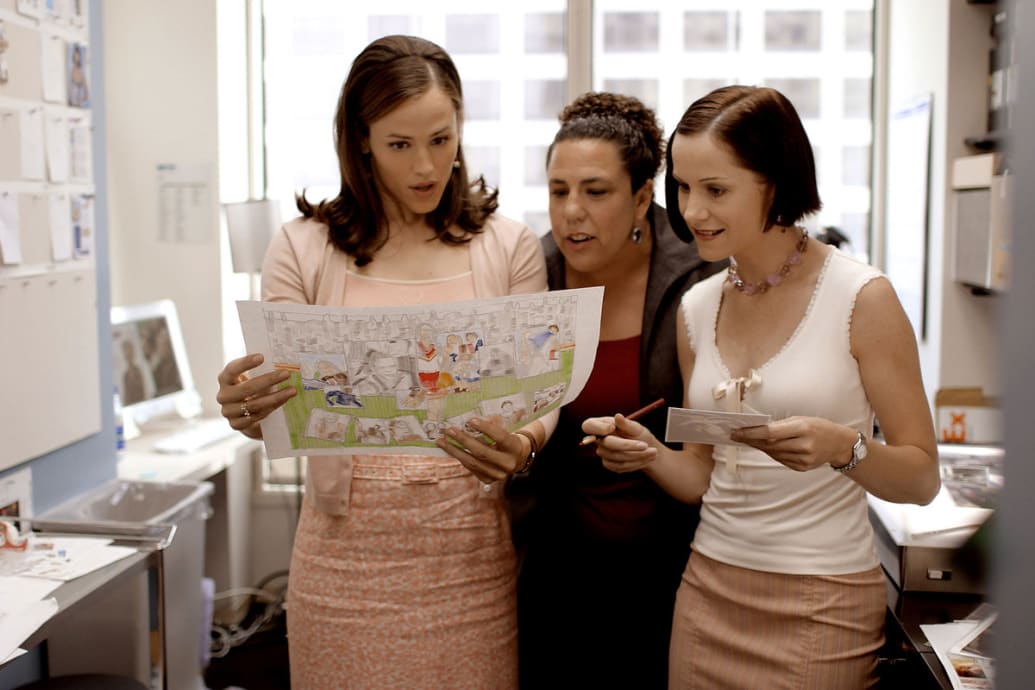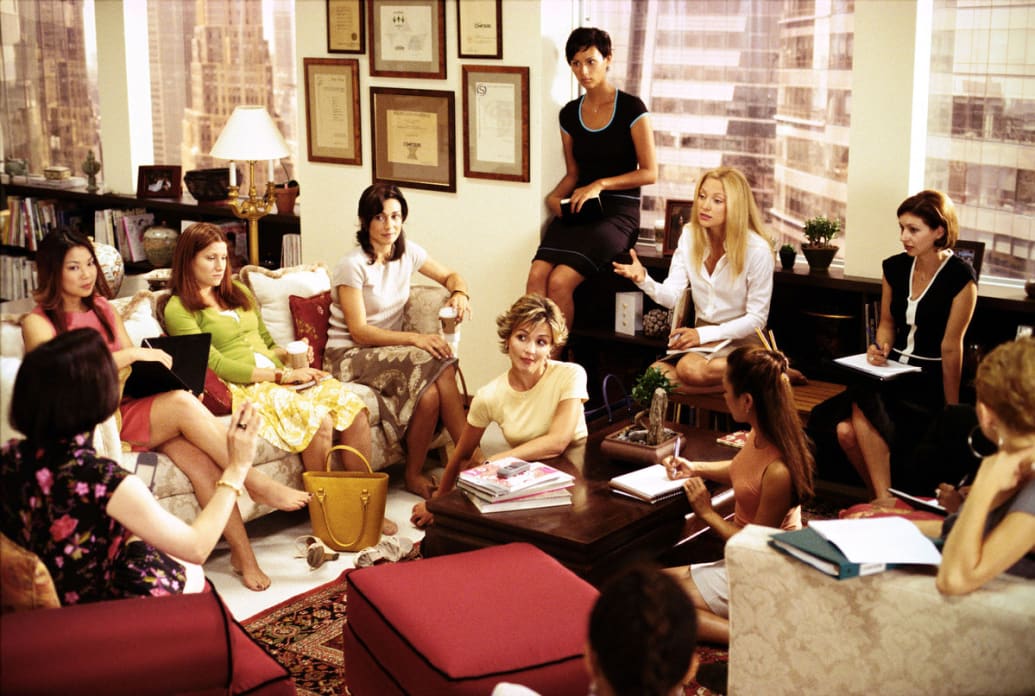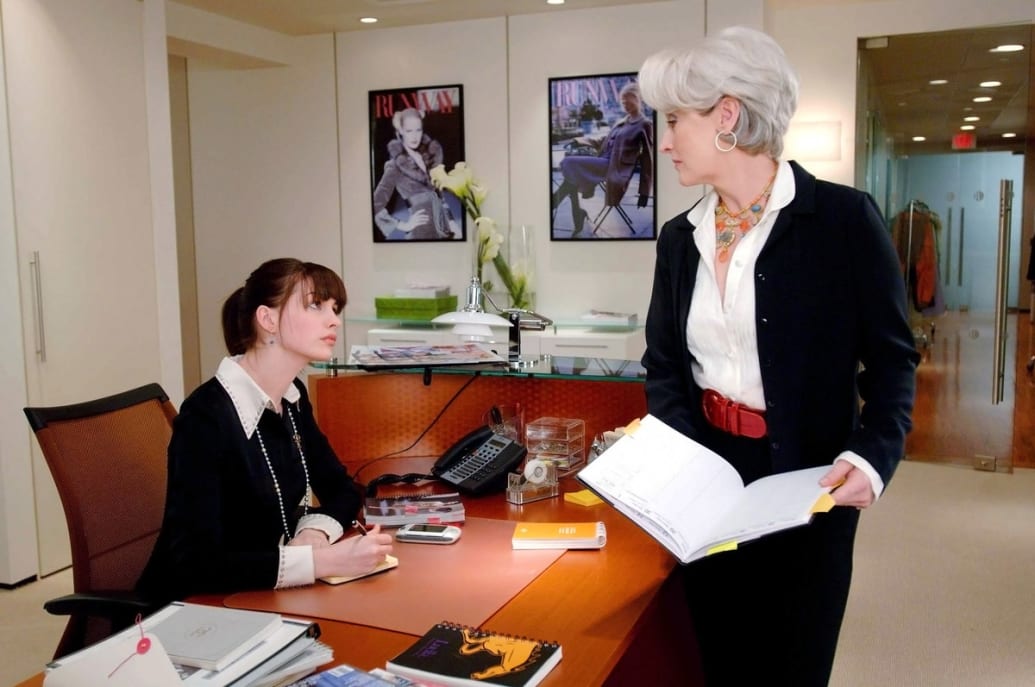Welcome to modern rom-com week at The Daily Beast’s Obsessed! In honor of two big romance releases this week—The Fall Guy and The Idea of You—we’re celebrating everything we love about the last 15 years of romantic comedies.
As a journalist who came of age during the early aughts, I have a bone to pick with rom-com screenwriters. When I think back on the movies that raised me—stories like How to Lose a Guy in 10 Days, The Devil Wears Prada, and 13 Going on 30 (which has personally victimized me by turning 20 this month)—almost all of them have one thing in common. They each told the story of a journalist, usually a magazine writer but sometimes a TV reporter or a tabloid photographer, who fell in love in the most improbable of ways. Now, as a reporter in her thirties who has seen the New York dating scene (and media) for herself, I have to ask: Why did you all lie to us like this?!
I recognize that most rom-com writers are not interested in sharing the gritty reality of dating, or New York, or their protagonists’ careers. And humor aside, I’m not that mad at the glamorous sheen they’ve historically painted over journalism as a career choice. (Although I will say, I had extremely inflated expectations for my shoe budget.) Still, like the famous New York Star columnist Carrie Bradshaw (who made her debut in 1998 and certainly helped kick off this trend) I couldn’t help but wonder… What was it about the magazine girlie that got screenwriters so excited? After carefully studying all of the subgenre’s most famous entries, I’m ready to pitch my think piece. Let me just grab my tri-fold board and balloons and get out my pointer.
Obviously, the 2000s did not invent the newsroom-based romance. His Girl Friday, which premiered in 1940 and starred Cary Grant alongside Rosalind Russell, might be the ur-text for this genre. We did, however, start to see an undeniable uptick in journalists falling in love in the late ’90s. See: My Best Friend’s Wedding, Sex and the City, and Never Been Kissed. By the early aughts, it seemed like every year we got a new one—Bridget Jones’s Diary in 2001, How to Lose a Guy in 10 Days in 2003, 13 Going on 30 in 2004, Hitch in 2005, and The Devil Wears Prada in 2006. James Marsden flipped the script in 2008’s 27 Dresses, which bestowed the journalism job on its male lead, but generally it’s the woman who has chosen to scratch out a living from the written word.

Columbia Pictures/Courtesy Everett Collection
On a writing level, a big driver behind the proliferation of Andie Andersons and Jenna Rinks in the rom-com world might be that a journalism job tells us a lot about a character in a short time. When a person makes their living from writing stories, their day-to-day work can easily telegraph their values. In pretty much every rom-com starring a female journalist, her relationship with her job proves illuminating. Maybe I’m wrong, but I’m guessing we wouldn’t learn nearly as much about these women’s inner lives from their work if they were, say, financial analysts.
In How to Lose a Guy in 10 Days, Kate Hudson’s Andie hates her fluffy magazine job because she’d rather be writing serious pieces like (lol) “How to Bring Peace to Tajikistan”; meanwhile, in Hitch, Eva Mendes plays a jaded tabloid photographer named Sara Melas, whose closed-off nature is apparently a hot topic of conversation in the office. (In a truly bonkers departure from reality, her boss even urges her not to publish photos that might damage her personal relationships. I’m sorry, but on what planet would that happen?! Anyway…)
The list goes on and on. In Sex and the City, Carrie Bradshaw—ever the self-centered dreamer, processes her every interaction in print. In The Devil Wears Prada, Anne Hathaway’s allegedly dowdy but actually very normal-looking character Andy Sachs caters to her nightmare boss’s every whim to get ahead—which quietly demonstrates that her ambition might outweigh her commitment to her friends. (I know she’s got her defenders and that a lot of people think her boyfriend, Nate (Adrian Grenier) is a selfish loser, but those of us who read the book know the truth—Andy really did kind of suck!) And in Bridget Jones, we watch Renee Zellweger’s character transform from a hapless publicity assistant to a more self-assured (if still also kinda insecure and sometimes bumbling) TV reporter.

How to Lose a Guy in 10 Days
Paramount/Courtesy Everett Collection
Beyond what the job can tell us about our protagonist, a journalist lead also opens up a whole host of workplace-comedy possibilities. In How to Lose a Guy in 10 Days, we get to sit in on an editorial meeting where writers brainstorm how to mine a woman’s break-up trauma for #content. In 13 Going on 30, Jenna has to pitch dueling magazine revamp ideas against her middle-school nemesis, Lucy “Tom-Tom” Wyman (Judy Greer)—who comes armed with a very… erm… avant-garde presentation. (RIP, “Fashion Suicide.”) There’s also that decrepit work party, where Jenna rescues her boss (Andy Serkis) from a panic attack by getting everyone to dance to “Thriller.” Meanwhile, The Devil Wears Prada is an endless font of expensive ridiculousness, from the closet make-over (since when does Vogue let employees walk off with expensive merch?) to the corporate betrayals that unfold in Paris.

20th Century Fox/Courtesy Everett Collection
And now, we arrive at my final, most cynical pet theory. Part of the reason so many rom-com heroines work as writers could be that generally, working as a reporter does not upset the preciously guarded gender norms of the hetero world. (At least, not if you’re writing the sorts of things all of these women do.) If a woman were to work in, say, a STEM career, the film might not play as well with traddy audiences who think women can’t do math. A female doctor or lawyer might make too much money and carry herself with too much assurance to ever be seen as fuckable. A writing career, though? It’s romantic—think: homecoming-themed presentations and public declarations of love, published in print!—and also, it’s just underpaid enough to incentivize marriage. For this genre, that’s a match made in heaven.
What could the future hold for the rom-com magazine girlie? Will the impending collapse of media as we know it spell her doom, or will she rise again like a gorgeously manicured phoenix from the ashes of print media’s cremation? Maybe she’ll run a viral TikTok account? Whatever form she might take, something tells me we haven’t seen the last of her. A magazine launch party is, after all, a terrible setpiece to waste.
